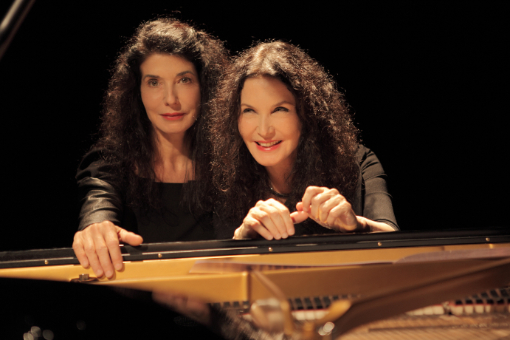LABÈQUE TO THE DRAWING BOARD
Forty years since they made their U.S. debut with the Los Angeles Philharmonic, French sisters Katia & Marielle Labèque returned for a program that seriously needed to rethink its programming. After the duo’s take on Ravel’s Mother Goose Suite for four hands (1908), the French pianists — led by Marielle’s husband, Russian-American conductor Semyon Bychkov — joined the LA Phil for its first performance of Bruch’s rarely heard Concerto for Two Pianos and Orchestra (1912). After intermission, the beefed-up orchestra took on the not-so-rarely performed Symphony No. 7 by Dvořák (1884), but it never fully came together, and barely made up for an enervating first half.
Let’s just go in order here. Ma mère l’oye (Mother Goose Suite) is typical of Ravel’s style with its modal melodies, use of dance forms and rhythmic precision. For this suite, Ravel selected five favorite French fairy tales with references to fantasy, dreams and legends of childhood, and provided simple and delicate settings for piano duet: one piano, four hands (he later orchestrated it, which is how the suite is usually presented). Although featuring childhood themes, this delicate, hauntingly, mystical, playful, beautiful work is for late intermediate to early advanced level — meaning it’s tough to execute but there aren’t any fireworks to speak of. (Even less than the originally scheduled Schubert Fantasia in F minor for piano four-hands; I wonder if the sisters decided to swap pieces to seek and/or accommodate patrons for Mother’s Day weekend.)
The Labéques normally add an element of fierce emotion in their work, but sitting side-by-side in front of a rapt audience, the keywords here were “sensitive” and “pianissimo” — which wasn’t the best way to set a context for the night (a series of Lutoslawski Variations would have been a great bet). It was evident how well the sisters complement each other, but neither one was intense, fiery or emotional, as I have seen them in the past. Wearing black bell-bottom slacks, the lights caught their bejeweled black tops (Marielle with clear crystals, Katia had red), which acted as mirror balls shooting flashes of luminescence throughout Disney Hall. Their work here was completely satisfying but left the viewers a bit languid, so no encore.
The German composer Max Bruch wrote his Concerto for American duo-pianist sisters Rose and Ottilie Sutro, but they augmented it with thousands of changes throughout their lifetime (at the onset in 1917, one version was reduced from four movements to three). At a 1971 auction of Ottilie’s estate, two boxes — one with the sisters autograph copies and one with orchestral parts — were discovered and then reconstructed by two other American pianists, Nathan Twining and Martin Berkowsky, who recorded this new version in 1973. Even with the work as close as possible to the original, it should be noted that Bruch — according to Christopher Fifield’s biography Max Bruch: His Life and Works — re-scored this piece from his Third Suite for organ and orchestra.
It’s always exciting at an orchestra’s premiere, but it made sense why this work — recorded by the Labéques and Bychkov in 1993 — is not often done. I understand that the repertoire for two pianos and orchestra is limited, but this four-movement piece is positively generic. Dripping in Romanticism but with littler charm, it’s in the rarely used key of A-flat minor — that’s seven flats; and “flat” could best describe the piano parts, which are somewhat brusque and browbeating while never giving the soloists the kind of concerto instrumentation they need to show off. Worse yet, the dense, domineering and despairing orchestral accompaniment often drowned them out. And because it starts in a solemn mood, the whole affair became lulling and uninspiring. (It does make for non-distracting background music as I write this.)
And a note to the pianists: You are paid a lot of money to be full and present at these concerts, so memorize your music! Staring down at the pages in front of you doesn’t allow for much emotional improvising.
Semyon Bychkov is one of the hardest working, in-demand conductors in the world. With extensive experience in Europe and throughout the world, he has been a truly international artist for just about 30 years. This fall, he succeeds the late, great Jiří Bělohlávek as Chief Conductor & Music Director of the Czech Phil, which under Bělohlávek’s leadership has become one of the most exciting orchestras on the world stage (the 2014 6-CD collection of Dvořák’s Complete Symphonies & Concertos is one of my favorite recordings of this century). While his intense rendering of Dvořák’s 7th with the LA Phil lacked the same volume and punch as his predecessor, Bychkov — as with LA Phil’s leader Gustavo Dudamel — is brilliant at finding new ways to communicate what has come before: The textures are brought out vividly allowing us to hear things that perhaps haven’t noticed before.
While the interpretation from this yeoman – who worked up quite a sweat — was exciting, colorful and upright for some individual players, it lacked drive and drama — the parts were greater than the whole. The good news is that he played up the mysteriousness and downplayed the charm, showing how catastrophic, and indeed dangerous, this work is. Could the Phil have been tired after just wrapping up an exhausting tour?
It will be fascinating to see how Bychkov does with his new band, as their coast-to-coast tour this fall (Oct. 27 – Nov. 12) includes the 7th. (At Segerstrom on Nov. 7 & 8, 2018, where he will also offer pieces from his multi-year project to shed light on Tchaikovsky’s major orchestral works, Bychkov will be joined by cellist Alisa Weilerstein, Nov. 7, and pianist Kirill Gerstein, Nov. 8.)
photos courtesy LA Phil
Los Angeles Philharmonic
Semyon Bychkov, guest conductor
Katia & Marielle Labèque, pianos
RAVEL: Mother Goose Suite
BRUCH: Concerto for Two Pianos and Orchestra
DVOŘÁK: Symphony No. 7
Walt Disney Concert Hall
played May 12 & 13, 2018
for future events, call 323.850.2000 or visit LA Phil




